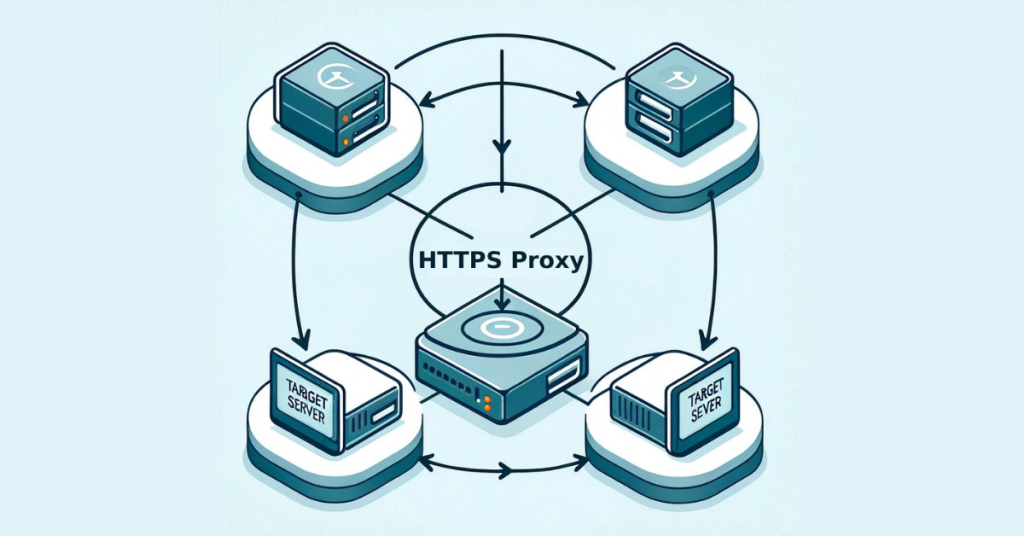In the modern digital landscape, privacy, security, and efficient internet usage are paramount. HTTPS proxies are a vital tool that helps achieve these objectives. This article delves into what HTTPS proxies are, why they are necessary, and where you can purchase them.
Table of Contents
What is an HTTPS Proxy?
An HTTPS proxy is a type of proxy server that uses the Hypertext Transfer Protocol Secure (HTTPS) to manage internet traffic. Unlike regular HTTP proxies, HTTPS proxies encrypt the data exchanged between the client and the server using SSL/TLS protocols. This encryption ensures that sensitive information such as login credentials, personal details, and financial data remain confidential and secure from eavesdroppers and malicious actors.
HTTPS proxies act as intermediaries between your device and the internet, forwarding your requests to the web servers and returning the responses to you. This process helps mask your IP address, providing anonymity and preventing your online activities from being tracked. Additionally, HTTPS proxies can cache web content to speed up access to frequently visited sites and filter traffic based on specified rules.
These proxies are widely used for secure transactions, confidential communications, and accessing restricted content. By using an HTTPS proxy, you can bypass geo-restrictions, avoid internet censorship, and ensure a safer browsing experience.
Why Are HTTPS Proxies Needed and How Are They Used?
In today’s digital world, maintaining security and privacy while navigating the internet is of utmost importance. HTTPS proxies play a crucial role in enhancing these aspects by offering encrypted communication, thus protecting data from potential threats. This article explores the necessity of HTTPS proxies and provides examples of their diverse applications.
Also read: Free VPN as an Integral Part of Computer Technology in the World of DevOps
Why HTTPS Proxies Are Needed
HTTPS proxies are essential for various reasons, primarily revolving around security, privacy, and access control. Here are some of the key reasons why HTTPS proxies are indispensable:
- Enhanced Security: HTTPS proxies encrypt data transmission between the client and server, safeguarding sensitive information from interception by cybercriminals.
- Anonymity and Privacy: By masking the user’s IP address, HTTPS proxies ensure that online activities remain private and untraceable.
- Access Control and Monitoring: Organizations use HTTPS proxies to monitor and control employee internet usage, ensuring compliance with corporate policies.
- Content Filtering: They block access to malicious websites, enhancing security by preventing phishing attacks and malware downloads.
- Bypassing Geo-Restrictions: HTTPS proxies allow users to access content that is restricted based on geographical locations, such as streaming services or censored websites.
- Improving Internet Performance: By caching frequently accessed content, HTTPS proxies can significantly reduce load times and save bandwidth.
- Secure Online Transactions: They ensure that financial transactions and personal information exchanges are encrypted and secure.
- Preventing Bandwidth Throttling: HTTPS proxies can help bypass ISP throttling, providing a faster and more reliable internet connection.
- Web Scraping and Data Gathering: Businesses use HTTPS proxies for web scraping to gather data from websites without getting blocked.
- Testing and Development: Developers use HTTPS proxies to test websites and applications under various network conditions and locations.

Examples of HTTPS Proxy Usage
HTTPS proxies are essential for a variety of reasons, offering numerous benefits for both personal and professional use. Here are some key reasons why they are needed and how they are typically utilized:
- Corporate Security: Businesses employ HTTPS proxies to secure their internal communications and protect sensitive information from being intercepted.
- Educational Institutions: Schools and universities use HTTPS proxies to monitor and filter internet access, ensuring students do not access inappropriate content.
- Personal Privacy: Individuals use HTTPS proxies to maintain anonymity while browsing the web, preventing tracking and data mining by advertisers.
- E-commerce: Online retailers use HTTPS proxies to secure transactions, protecting customer payment information and personal details.
- Streaming Services: Users rely on HTTPS proxies to access streaming content that is unavailable in their region due to licensing restrictions.
- Journalism and Research: Journalists and researchers use HTTPS proxies to access information from restricted websites, ensuring their activities remain private.
- Travel: Travelers use HTTPS proxies to bypass local internet restrictions and access familiar websites and services while abroad.
- Competitive Analysis: Companies use HTTPS proxies to gather data from competitors’ websites without revealing their identity.
- Marketing Campaigns: Marketers use HTTPS proxies to manage multiple accounts and campaigns on social media platforms without facing account bans.
- Gaming: Gamers use HTTPS proxies to reduce lag and access games and servers that are region-locked.
In summary, HTTPS proxies are a vital tool for enhancing online security, maintaining privacy, and providing access control. Their applications are diverse, ranging from personal privacy protection to corporate security and beyond. By encrypting data and masking user identities, HTTPS proxies ensure a safer and more efficient internet experience. Investing in a reliable HTTPS proxy service can significantly improve your online activities, whether for personal use or professional purposes.
Comparison of HTTPS, HTTP, and SOCKS Proxies
Proxies are essential tools for enhancing online privacy, security, and access control. Among the various types, HTTPS, HTTP, and SOCKS proxies are the most commonly used. This article compares these three types of proxies to help you understand their differences and select the best one for your needs.

HTTPS Proxies
HTTPS (Hypertext Transfer Protocol Secure) proxies provide a secure and encrypted connection between the client and the server. They are an extension of HTTP proxies but include SSL/TLS encryption, ensuring that data transmitted is protected from interception and eavesdropping. HTTPS proxies are particularly useful for accessing websites that require secure logins and handling sensitive information, such as financial transactions or personal data.
- Security: High, due to SSL/TLS encryption.
- Anonymity: Good, as they hide the client’s IP address.
- Performance: Slightly slower due to encryption overhead, but generally fast.
- Use Cases: Secure browsing, online banking, accessing restricted content.
HTTP Proxies
HTTP (Hypertext Transfer Protocol) proxies are one of the most basic types of proxies. They facilitate the transfer of data between a client and a web server over the HTTP protocol. While HTTP proxies can mask the client’s IP address and improve access control, they do not provide encryption, making them less secure than HTTPS proxies.
- Security: Low, as there is no encryption.
- Anonymity: Moderate, as they can still hide the client’s IP address.
- Performance: High, due to lack of encryption.
- Use Cases: Accessing non-sensitive information, web scraping, content filtering.
SOCKS Proxies
SOCKS (Socket Secure) proxies operate at a lower level compared to HTTP and HTTPS proxies. They can handle any type of traffic generated by any protocol or program, making them highly versatile. SOCKS proxies, especially the newer SOCKS5 version, offer better performance and more advanced features like support for UDP and authentication. However, they do not inherently encrypt data, so they might require additional security measures.
- Security: Variable, depending on the use of additional encryption.
- Anonymity: High, as they mask the client’s IP address effectively.
- Performance: High, with support for both TCP and UDP protocols.
- Use Cases: Gaming, video streaming, peer-to-peer sharing, bypassing firewalls.
Conclusion
In summary, the choice between HTTPS, HTTP, and SOCKS proxies depends on your specific needs:
- HTTPS Proxies are best for secure, encrypted connections, essential for sensitive data transactions.
- HTTP Proxies are suitable for basic tasks that do not require encryption, offering better performance due to the absence of encryption overhead.
- SOCKS Proxies provide versatility and high performance, ideal for a wide range of applications but may require additional security measures for sensitive data.
Understanding these differences will help you choose the most appropriate proxy type for your requirements, ensuring a balance between security, performance, and functionality. When it comes to purchasing HTTPS proxies, choosing a reliable provider is crucial to ensure quality and performance. One recommended provider is Proxy5.net, which offers a range of HTTPS proxies tailored to meet various needs. By purchasing the services of this proxy service, you gain access to high-speed, reliable proxies with robust security features and support for multiple protocols. Investing in quality HTTPS proxies from a trusted provider guarantees enhanced privacy, security, and overall internet experience.
[…] major operating systems. It also features cross-platform utility, which includes support for HTTP, HTTPS, FTP, and IMAP. This makes it an easy tool to send requests to APIs and scrape […]
[…] Also Read: What Are HTTPS Proxies? […]
[…] it’s simply the upgraded version of SSL. Its main job? Making sure that when you see “HTTPS” in your browser’s address bar, you can feel confident that your information is private […]